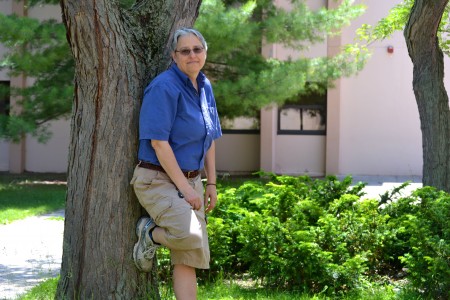

Debbie Bondy grew up in Dearborn, graduated from Fordson High School with a focus on automotive repair, and continued her automotive education on a full scholarship at Henry Ford Community College. Over the years, Bondy earned certificates and associate degrees from HFCC in automotive repair, computer science, architectural construction and pre-education.
She continued her post-secondary education at Wayne State University, earning a bachelor of fine arts with a major in technical theatre—scenic design. She has worked in several fields and owned and operated two companies before making her final career change to education. Bondy has taught at all levels of k-12 education, in addition to post-secondary education.
After graduating from Eastern Michigan University with a post-baccalaureate degree in secondary education, she was hired to teach technology education at Scarlett Middle School. She has taught five years at Scarlett, and for the past four years, Bondy has taught the Project Lead the Way (PLTW) curriculum to her sixth, seventh, and eighth graders. She will transfer to Slauson Middle School in the fall.
Bondy commutes from Dearborn, but is looking to move to the Ann Arbor area this summer.
Why did you decide to become a teacher? I don’t have any teachers in my family, so I never thought of it as an option when I was growing up. I have always been interested in hands-on stuff. One day, I got to thinking about what I enjoy doing. The answer that came to me was teaching people and being around kids. That fall I began taking education classes. I have always enjoyed school and learning, so I wanted to bring that same enjoyment to others.
What keeps you motivated? Seeing my students engaged and eager to learn. I get a lot of energy from my students. One of my motivators is that “light-bulb” moment when they get a concept or complete a project. During one of my seventh grade Automation & Robotics classes, we ran out of time to properly complete an assignment. I told my students that they would not be graded on this project but if they wanted, they could come after-school to work on it. I had them showing up after-school to work on getting their LEGO robots to work.
In addition to teaching your classes, what else do you contribute to your school community? I sponsored the Coding Club that finished on May 28. We had 32 students sign-up for the club, averaging about 11 students each week. We all had a great time and learned a lot. It is challenging to get students into clubs because we only have late busses two days a week, so most of our after-school activities are scheduled for those days. I have taken responsibility for one of our computer labs. I keep the lab clean; I wipe down the monitors, keyboards and mice. I report any issues I cannot resolve to our IT tech. I have also taken responsibility for our courtyard at the center of the school. I rake, weed, mow, trim trees and pick up trash. I want it to be a place to relax for both staff and students.
If you weren’t teaching, what would you be doing? I would be traveling the world, and when I’m at home I would be tinkering in my shop.
What are the biggest challenges of the job? Keeping the curriculum engaging and authentic. Making time to set-up activities and time to organize, order, store and repair materials and equipment. Just keeping track of the “stuff” is a full-time job. Getting students and staff to understand the importance of my curriculum and how it prepares students for continuing education, careers and life in general.
What do you wish people knew about the teaching profession? You don’t become a teacher to make money. I came across a job offer from 1986 with a salary higher than my current salary. You are a teacher even when you are outside the classroom. It is similar to owning a company, in that you are always working. I am always looking to network with people that may be able to contribute something to the learning environment. We teach because we are life-long learners and what to share our love of learning with our students. I want to do whatever I can to help my students become successful in life.
What is the most rewarding part of teaching? When I run into my former students and they tell me what they are doing and the things they accomplished and their plans for the future. Of course, hearing how they felt about their experience as your student is the best. One of the eighth grade girls in the Coding Club wrote, “Thanks so much for 3 years of awesomeness!! I’ve learned so much and the coding club was such a good idea! Continue it if you can!”
What do you do when you’re not teaching? My two favorite things to do are 1) traveling, so I can experience new cultures and foods, and 2) tinkering. I use to travel with my dad and I have been a tinkerer for as long as I can remember. I was always taking something apart and trying to fix it. My thinking was it was already broke, so why not try and fix it?
I play softball, bike and play pickleball. I enjoy kayaking, skydiving, snorkeling and watching the Detroit Tigers. I have played billiards international; I attend film festivals and explore museums. I was awe struck at the Louvre and plan on another visit.
_Jo Mathis, AAPS District News Editor

Be the first to comment